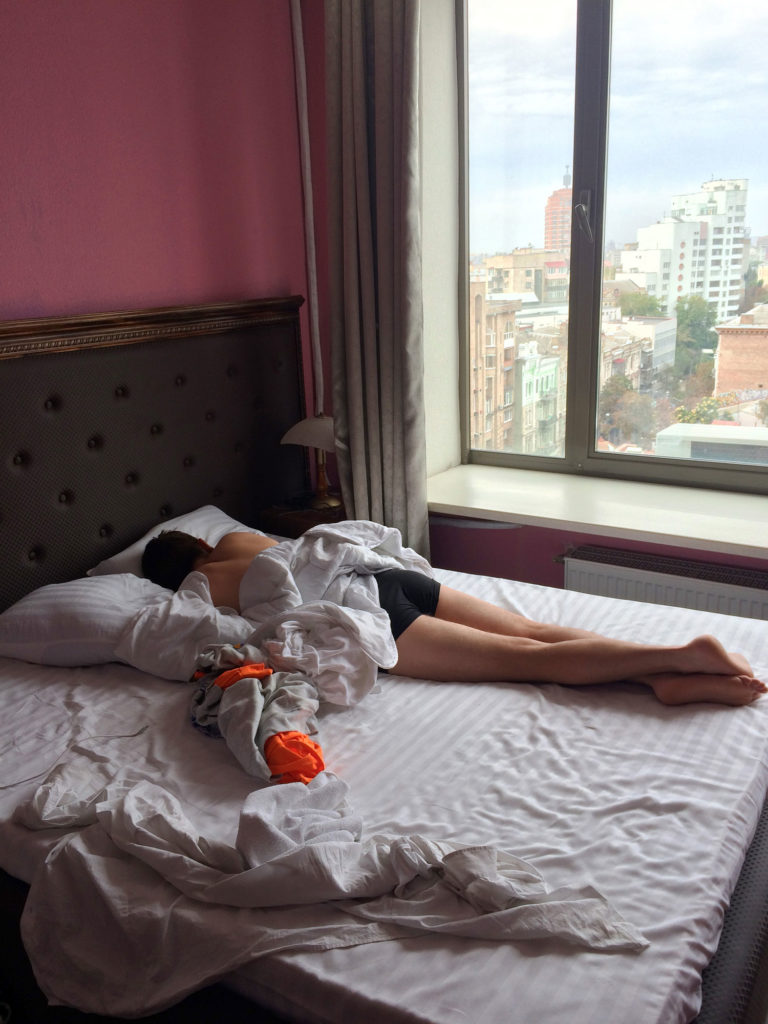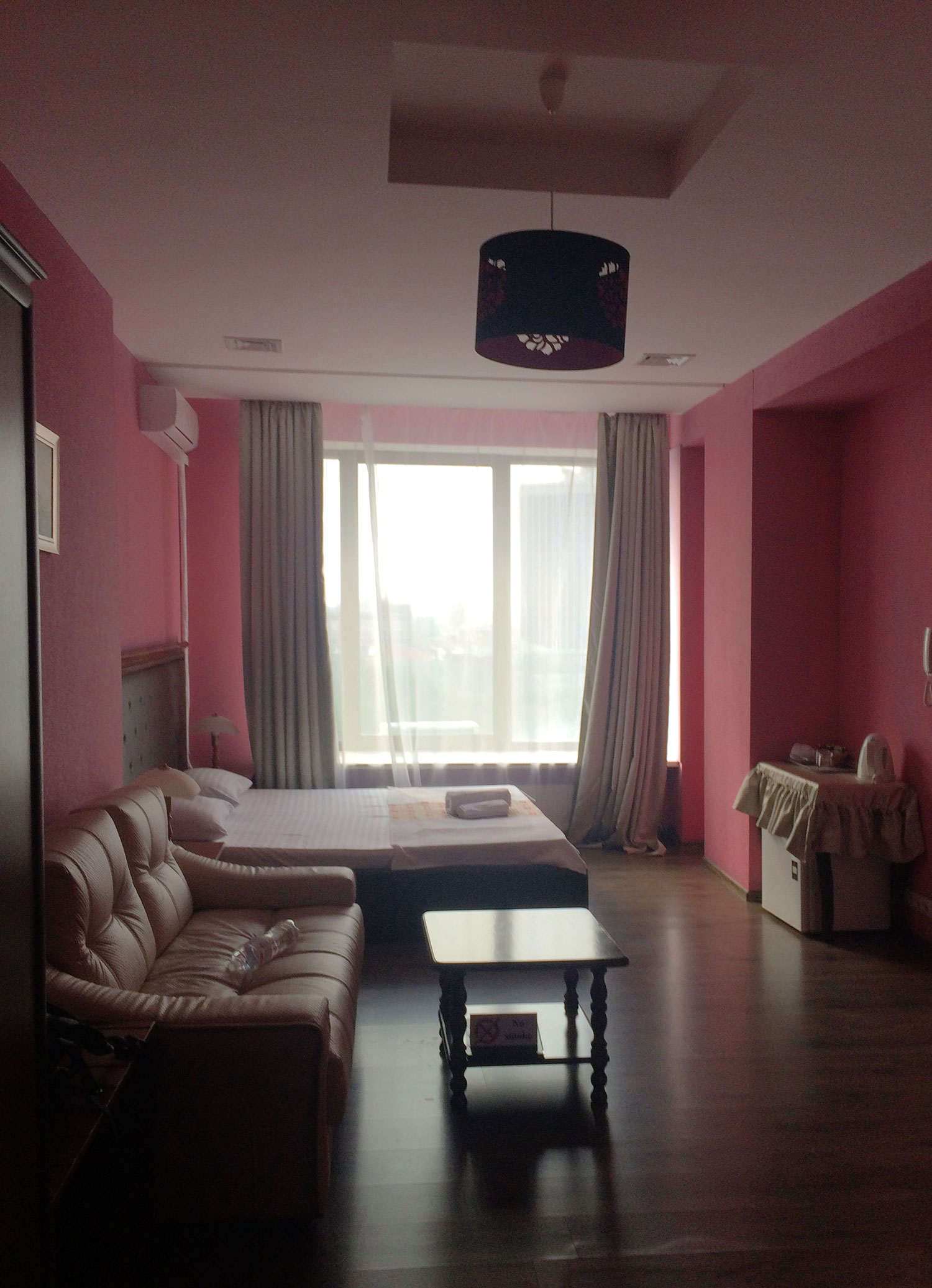
Dan Bodan spent November 8 to December 8 in residence at the Goethe Institute in Tehran. Flash Art invited him to write a travelogue during his time there. This is the sixth and final installment.
I’ve been trying to teach myself to pray this past year, apparently shaken out of some spiritual hibernation by the tanks and explosions of last years’ war parade down Khreshchatyk Boulevard during my first visit. Now, every sunset, every body of water, every kind gesture is a catharsis in which I drop to my knees, rip open my chest in reverence, pull out my teeth and, with tears streaming down my face, mouth the words: “Thank you, thank you, thank you.”
It’s ridiculous but refreshing.
Friends have tried to ask me to define what exactly I mean by praying, and usually I say something like, “You know, nature, energy… that stuff,” because I really don’t have any better way to describe it, and I worry that if I put it into words I might break the spell and it’ll disappear.
This spring I’m walking with a friend through the Neapoli neighborhood in Athens, right where it slopes up to Mount Lycabettus, a hill formed when Athena dropped a piece of limestone after receiving bad news from a white raven (which she then turned black). I hear the sounds of vespers beginning from one of the ubiquitous orthodox churches that appear every few hundred meters. I suggest we enter, but my friend tells me she won’t, that she hates the Byzantines because for her they represent the end of the Goddess in Western culture. She does yoga every morning and lights a candle to Saint Expedite and a cast of deities she’s collected through books, study, and travel, and has developed a version of mythology on her own terms that forms an aesthetic center for her morning ritual and comforts her in times of crisis.
I, however, want to go into the church and demand they explain how they’re communicating with their god so I can better understand how to communicate with mine. I do finally step in one day, but I find myself feeling underwhelmed and a bit stifled. Guess I’m happier with my sunsets and the magic of pollen in the air than dark halls with bearded men in black robes. The sound of their prayer, though, is undeniable: a purity of belief that, regardless of my own feelings about big-brand religions, is impossible to disregard.
While buying milk at a convenience store in Tehran I notice, behind the till, the shop owner on the floor crouching in prayer, his body directed toward mecca. His co-worker walks over him to ring me up and then walks back over him to continue taking inventory, the ceremony never interrupted. That a prayer can take a form so simultaneously committed and casual, so integrated but performative, is a phenomenon to me.
***
So here I am: me, the sky, and this tiny drunk Ukrainian creature whose body treats mine with such kind firmness that every cynicism I try and invoke to pull myself out of this moment is immediately vaporized when I feel the pulse of his breath escaping. I convince myself that I am comfortable in this moment, even if the awkward position he’s pulled me into is killing my lower back. But I’ll stay here, my body curved in reverence and ritual.
I’m listening to his heart and it sounds healthy and Jiminy Cricket is whispering in my ear that I need to be careful about this guy, that I have a bad habit of investing considerable energy into too-short moments with friendly guys in foreign places. But I believe in these moments (whatever they are)! This moment of quiet ecstasy perfumed by the smell of his breath, an entire bottle of white wine and countless whiskey sours. Is this what the Sufis sing about? All the elements are here for a Rumi verse. I’m writing love letters in the sky with my eyes, dotting each ‘i’ in “i love you” with a new star. An infinite number of love letters directed nowhere and everywhere. Momentarily balancing complete selfishness with altruism.
I guess this is praying.
I follow the steps:
I tear my body apart to share and absorb with what’s around me at the same time.
I pull out my teeth to demand change.
I make a vow to try and never celebrate cruelty.
And I mouth the words: “Thank you, thank you, thank you.”
Walking home, he picks me a marigold and I absentmindedly place it in my pocket and forget about it. When I find it a week later back in Berlin, dried up and shriveled, I place it on my window sill alongside a bottle of gold schnapps made by German monks, a white plaster bust of Nefertiti, a brass Omega sign I got from a fisherman in Piraeus, and a peach-colored sea shell I picked up on the beach of Kamakura. My collection of relics.
It’s my last night and he’s asleep next to me. I’m leaving in a few hours, so that’s where this ends. We’ll send each other hearts and flower icons, type “miss you” and gently tap a piece of glass to confirm our existence to one another with less and less frequency for seven days until we’re strangers again and he becomes another myth that I’ll spend a few sleepless nights like this trying to understand.
But for now my body is open.
My lips are almost raw from earlier that night. He’s folded himself into me again and is holding on so tightly I feel like I’ll rupture and burst into dust.
Moments like this happen so rarely that I’m convinced it’s a manipulation from god so that we’ll forgive ourselves for everything else.
At 6 am on the eleventh floor in a hotel room painted pink,
out the window sunlight is lipping a gold-topped church and a radio tower with its first breath
and I am stroking your eyebrows and the loose hairs come off on my thumb
and for each one I make the same wish: that time will bend to my will and stretch this moment out for millennia and we will turn to marble.
You press your chin into my neck and I am completely undone.
(“Thank you, thank you, thank you.”)


